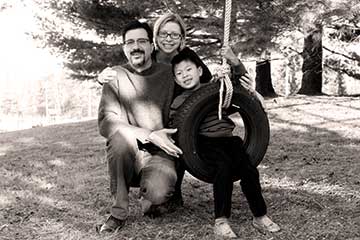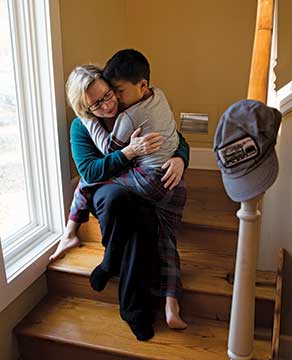SOMETIMES THINGS YOU DIDN’T ASK FOR
CAN TRANSFORM LIFE IN REMARKABLE WAYS
STORY BY Julekha Dash PHOTOGRAPHY BY Lisa Shires
Like many women, Lisa Wilde’s vision of becoming a mother involved morning sickness, going into labor and nursing her newborn.
nursing her newborn.
But her journey to motherhood took a different route — the nearly three-year odyssey involved a lot of paperwork and scrutiny into her personal life.
The artistic director at Rep Stage in Columbia was rewarded for her patience when she and her husband, Philip Vilardo, adopted their son, Gabriel, from South Korea seven years ago.
“We’ve become a Korean-Italian- Irish family,” says Wilde, 50. “We’re bringing another culture into our house. I never would have anticipated that would be part of my life.”
Committing to adoption, however, required Wilde to change her perspective on motherhood.
“It was about changing my perspective about how we were going to have a family. That took a little bit of work for me.”
Wilde is just one of several Howard County women who have changed their life courses. One woman freed herself from a drug addiction and an abusive husband. Another is getting her career on track again after suffering a disability. Another shed 60 pounds.
Whether you’re changing your diet, your views on family or your career, all successful transformations involve key elements. Getting support from other people, coping with your emotions, adhering to accountability and turning your past struggles into a source of strength can all help transform your life.
COPING WITH EMOTIONS
Most transformations involve wrestling with a host of emotions and you need to recognize them in order to move on to the next phase, says Patricia A. Browne, an organizational development consultant who has led seminars on transformations, including many in Howard County.
If you don’t deal with the emotions first, they will snowball and get in your way, Browne says.
“Anything that’s a major change can be traumatic. Acknowledge whatever it is that’s in your way and separate yourself from it. Acknowledge the feelings that you’re experiencing,” Browne says. The Springdale resident worked in Howard County for many years and received her master’s of business administration from Johns Hopkins University’s Columbia campus.
Wilde says she realized she had to cope with the loss of not giving birth before she could truly embrace adoption.
“I had to go through a mourning process about not experiencing pregnancy. I really had to get my head around it,” she says. Wilde and her husband discuss these issues with their son. “We talk about that he didn’t grow inside of me and I didn’t nurse him,” she says.
DON’T GO IT ALONE
 Talking to the six other American families who had adopted children from South Korea through her agency helped Wilde learn how to meld a new culture into her home. The couples still share updates about their families via a Facebook page.
Talking to the six other American families who had adopted children from South Korea through her agency helped Wilde learn how to meld a new culture into her home. The couples still share updates about their families via a Facebook page.
Getting emotional support from others will give you the motivation to succeed and help you get back on your feet when you suffer any setbacks. Some have turned to good friends. Others have relied on a life coach or a therapist.
Lisa Willis, 46, turned to a new county program called Getting Ahead to help get her career back on track after suffering a disability. [See sidebar.] Her right foot was amputated following an unsuccessful surgery to remove a blood clot, forcing Willis to go on disability in January 2013 and leave her job as a clinical director at a community health care center.
Willis also joined a women’s networking group that met monthly. The women in the group encouraged Willis to turn her interest in fashion into a side business while she continued to pursue a full-time job in health care. Consequently, Willis is now doing more to promote her fashion business. She has made business cards to hand out to those interested in buying her crocheted items. She is also teaching a class on how to recycle old clothes.
BE ACCOUNTABLE
Supportive people will not only provide encouragement, they will also make sure you stick to your plan.
Write two or three things that you are committed to doing on a notecard and find someone who will hold you accountable if you don’t meet your goals, Browne recommends. That’s exactly what Browne did five years ago when she reached out to a professional life coach who helped her start her own consulting business after a 30-year career in the insurance industry.
“You could rely on a spiritual advisor, therapist, mentor or co-worker,” says Browne. But just make sure it’s not someone who is tied to you emotionally, like your best gal pal, she advises. “She might just tell you what you want to hear.”
Tracking your progress is another way to make yourself accountable.
Tish Heyssel, a software development manager who lives in Cooksville, lost 60 pounds in about 18 months, with the help of Fitday.com. Heyssel, who says she has kept the weight off for a year now, says the online weight loss journal helped her track everything she ate.
Though taking Zumba classes jumpstarted her weight loss, the pounds really began dropping when she combined
the journaling with the fitness routine at Brickhouse Cardio Club in Ellicott City.
“I stopped eating my workout calories,” says Heyssel, 53. “Instead of letting my workouts give me permission to splurge, I started thinking ‘if I eat this, then that will counteract half of my workout today.'”
TURNING ADVERSITY INTO STRENGTH
The women in Willis’ networking group not only encouraged her to pursue her business, they helped her realize that if it weren’t for the disability, she would not have discovered her interest in crochet.
“Crochet really helped me when I was dealing with the pain. I made a lot of different items,” Willis says. “It makes me feel good when I can use my hands to create something that people really like.”
Columbia resident Joyce Snow survived a devastating sexual assault in her hometown of Pittsburgh nearly a decade ago. She narrowly escaped the two men who broke into her home in search of drugs. They beat and raped her and held her against her will for nearly four hours.
But it was this devastating experience that gave her the strength to change her life for the better. She sought treatment for her drug addiction and left her abusive husband. Snow fled to Maryland in 2007 and chose Howard County because of its lower crime rate.
“I made a conscious decision to leave all negative surroundings behind and free myself. So my move to Maryland was the best decision I ever made in my life.”
Snow is now enrolled in nursing school and will receive her degree from Howard Community College in 2016. She also received the 2008 Soroptimist Women’s Opportunity Award, which provides cash grants so women can receive education and training to improve their lives.
Today, scars on her body remind Joyce of her past.
“My scars may remind me of where I have been, but I don’t let them dictate where I’m going.”*




